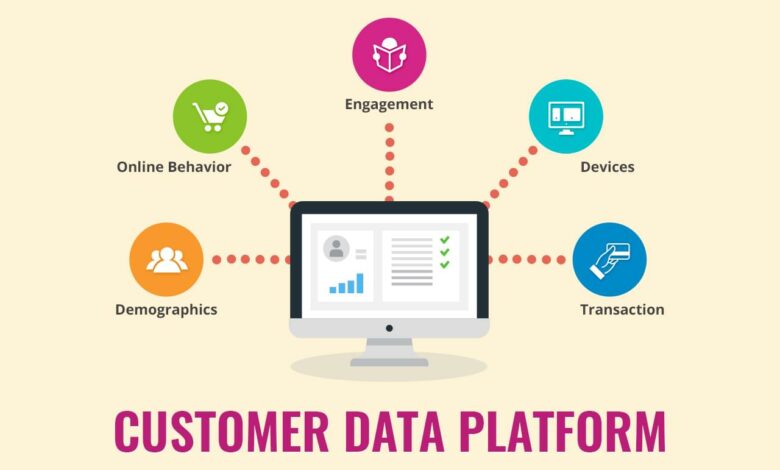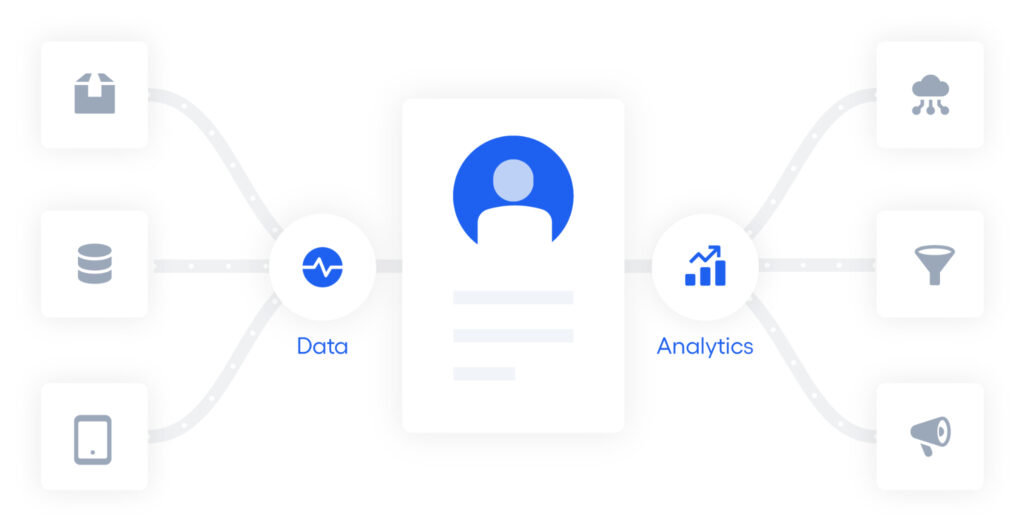Customer Data Platform Business Requirements

A customer data platform is fundamental to a successful business strategy. If your business is learning about this field, please refer to the article Customer Data Platform Business Requirements. We will analyze this area more specifically for your business.
Contents
What is a customer data platform business?
A Customer Data Platform (CDP) is a software application that collects and manages customer data from various sources, including online and offline channels. It is intended to consolidate customer data from various touchpoints and then provide a single, comprehensive view of each customer to assist businesses in better understanding their customers and their behavior.
A CDP assists businesses by delivering a unified customer view that allows them to better understand their customers’ preferences, behavior, and interactions with their brand. Businesses can use this information to create more personalized and relevant customer experiences, improve customer engagement and loyalty, and increase revenue.
CDPs are most commonly used by marketers, but they can also be beneficial to customer service, sales, and product teams. They are frequently combined with other marketing technologies, such as email marketing platforms, CRM systems, and advertising platforms, to provide a more comprehensive view of the customer and to enable more targeted and effective marketing campaigns.
Overall, a Customer Data Platform company focuses on providing businesses with the technology and tools they need to better understand and engage with their customers, ultimately driving business growth and success.
Benefits of customer data platform business
One of the primary advantages of a CDP is that it provides a unified view of each customer by combining data from various sources such as email, social media, mobile, and in-store interactions. This allows businesses to better understand their customers and provide a more personalized experience.
Improved customer segmentation: A CDP enables businesses to divide their customers into groups based on their behavior, preferences, and other characteristics. This makes it easier to develop targeted marketing campaigns that will resonate with each group.
Improved customer experience: Businesses can create more relevant and personalized experiences that meet their customer’s needs and preferences if they have a better understanding of their customers.
More efficient marketing campaigns: A CDP assists businesses in better tracking the effectiveness of their marketing campaigns by analyzing customer behavior and interactions. This enables them to optimize their campaigns and target customers with the right message, at the right time, and through the right channels.
Improved data governance: A CDP provides a centralized platform for managing customer data, ensuring consistency, accuracy, and adherence to data protection regulations. This enables businesses to reduce the risk of data breaches while also improving overall data security.
Overall, a customer data platform can help businesses gain a competitive advantage by improving customer engagement and loyalty, increasing revenue, and providing a better understanding of their customers. This is the next information in the Customer Data Platform Business Requirements.
Why should businesses use customer data platforms?
A customer data platform (CDP) is beneficial to businesses for a variety of reasons, including:
Improved customer understanding: A CDP enables businesses to unify data from multiple sources and create a comprehensive view of each customer. This enables businesses to gain a better understanding of their customer’s behavior, preferences, and needs, allowing them to create more personalized and relevant experiences.
More effective marketing: Businesses can create targeted marketing campaigns that are more likely to resonate with each customer segment if they have a better understanding of their customers. This can result in increased engagement and conversions, as well as a higher ROI for marketing efforts.
Improved customer experience: By providing more personalized experiences, businesses can boost customer satisfaction and loyalty while decreasing churn. This can result in increased revenue and customer lifetime value. This is the next information in the Customer Data Platform Business Requirements.
Increased operational efficiency: A CDP can assist businesses in streamlining and automating marketing processes such as segmentation, personalization, and lead scoring. This can save time and money while allowing marketing teams to concentrate on higher-value activities.
A CDP provides a centralized platform for managing customer data, ensuring consistency, accuracy, and compliance with data protection regulations. This enables businesses to reduce the risk of data breaches while also improving overall data security.
Overall, a customer data platform can assist businesses in gaining a competitive advantage by improving customer engagement and loyalty, increasing revenue, and improving operational efficiency and data security. This is the next information in the Customer Data Platform Business Requirements.
Disadvantages of customer data platform businesses
Complexity: CDPs can be difficult to set up and maintain because they must integrate with multiple data sources and systems. This can necessitate a significant amount of technical expertise and resources.
Cost: CDPs can be costly, both in terms of initial implementation and ongoing maintenance fees. Small businesses may struggle to justify the investment.
Issues with data quality: A CDP is only as good as the data it collects, and incomplete, inaccurate, or outdated data can hurt the quality of customer insights and personalization.
Concerns about privacy and compliance: CDPs collect and process large amounts of personal data, which can cause customers to be concerned about their privacy. Businesses must adhere to data protection regulations such as GDPR and CCPA, which can add complexity and costs.
Challenges with integration: Integrating a CDP with other marketing technologies can be difficult, especially when dealing with legacy systems or custom-built solutions.
While the advantages of a CDP may outweigh the disadvantages, businesses should carefully consider their needs, resources, and budget before investing in one. It is critical to assess the costs, potential risks, and complexity of implementation, as well as to ensure that data privacy and compliance issues are addressed properly. This is the next information in the Customer Data Platform Business Requirements.
Read more: Amazing Benefits of Customer Data Platform (CDP)
Conclusion
Understanding customer data will help us collect the necessary information to achieve a certain purpose. Best of all, you can enhance user experience, increase conversion rates, or even understand your customers’ latent desires through data analysis.
To get good data, businesses first need to effectively solve the problem of collecting, processing, and consolidating discrete and fragmented customer data. Hopefully, the article Customer Data Platform Business Requirements will provide you with useful information.
Conclusion: So above is the Customer Data Platform Business Requirements article. Hopefully with this article you can help you in life, always follow and read our good articles on the website: Tech.amthucdatviet.com







